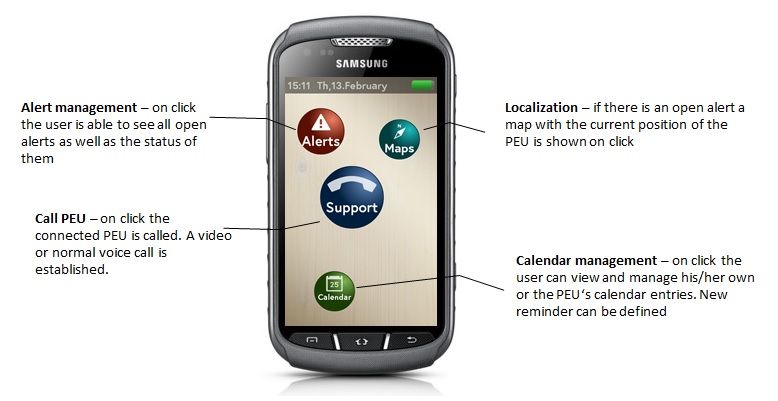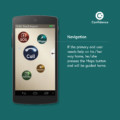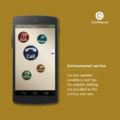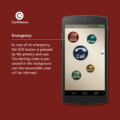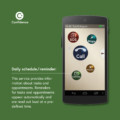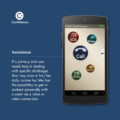CONFIDENCE – Mobility Safeguarding Assistance Service for People with Dementia
The CONFIDENCE project aims at providing mobility and safeguarding assistance services to people suffer from mild to moderate forms of dementia. It intends to develop a novel community-enabled mobility safeguarding assistance service that combines “assistive technologies” with “personal help”.

Mit dem Klick auf das Bild werden durch den mit uns gemeinsam Verantwortlichen Youtube (Google Ireland Limited) das Video abgespielt, auf Ihrem PC Skripte geladen sowie personenbezogene Daten erfasst.
Forms of assistance
The mobile service is a “virtual companion” providing different levels of assistance that can be adapted, depending on the situational needs of the patient and the degree of orientation loss.
- Virtual voice service (requesting assistance from care persons, who can locate the person in need on an electronic map and give them instructions on where to go)
- Virtual video service (for a face-to-face conversation or for checking on the patient’s physical status or environment)
- Location tracking service (provided the previous consent of the client, the person can be tracked on an electronic map during all his/her moves)
- Mobile community service (allowing care persons to be mobile themselves while giving instructions to persons who have lost orientation)
Goal
The goal of CONFIDENCE is the development of a mobility safeguarding assistance service which combines personal assistance and current technologies. There are various forms of support that can be adapted to the particular situation of the user. A special feature of CONFIDENCE is the underlying service model. This service model allows relatives, professionals and trusted volunteers to take over care of patients suffering from dementia via the CONFIDENCE platform. Technology-based assistance can be provided via web and mobile applications.
AAL Award
CONFIDENCE was awarded the AAL Awards (both jury and public award) in 2014.
AAL – Ambient Assisted Living Joint Programme: 2014 Best Project: AAL Award goes to CONFIDENCE
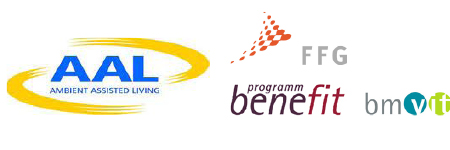
More information about the project
General
Mobility Safeguarding Assistance Service
with Community Functionality for People with Dementia
The aim of Confidence is to develop a community-based mobility safeguarding assistance service for people with mild to moderate dementia. Confidence combines “assistive technologies” with “personal help”. The Confidence service is built around a “virtual companion” providing different levels of assistance, depending on the situational needs of the individual person and the degree of orientation loss. The service is supplemented with personal help from family members, staff of home care agencies and/or trusted volunteers.
Details
Overview
Confidence offers a virtual voice channel (persons with dementia are able to request assistance from care persons e.g. when they lose orientation, they then can locate them on an electronic map and give them instructions on where to go), a virtual video channel (people with dementia can actually see the care person , thus creating a sense of confidence and security), a location tracking service (provided the previous consent of the person with dementia, he/she can be tracked while being on the move) and finally, a mobile care and community service (allowing care persons to be mobile themselves while instructing people with dementia). To keep service costs low, a credits system based on emerging mobile payment technologies will be established. To ensure a high acceptance of Confidence, end users (people with dementia, family members, professionals from home care agencies and trusted volunteers) will be involved in all phases of the projects. Therefore lead users will be involved in the project implementation phase and two field trials will be conducted in Austria, Romania and Switzerland.
Planned Results
From a technical point of view, the expected outcome of Confidence is a mobility safeguarding assistance service running on a smartphone. It consists of a locationaugmented voice service, a virtual video service, a location tracking service and a mobile community service. The technical solution is supplemented by an innovative, cooperative service model, which involves all relevant stakeholders of home care. Confidence aims at designing, implementing, testing and validating the technical solution as well as the service model.
Duration of the project and starting date
36 months; starting date 1st June 2012
Video
Scenario
The story …
Agnes H. was confused. She was sure that there used to be a bus stop for the bus back to her home village, right at that corner! But now, she could not find it. In fact, nothing around her looked familiar. Agnes got nervous and a bit scared, and not knowing what to do, she picked up her mobile phone. Thank God, she always had her phone with her, as her daughter, Michaela had urged her repeatedly to never leave the house without her mobile. She called her daughter who finally picked her up by car from a nearby café. Worried that it was something more serious, as her mother has shown repeated signs of memory loss over the past few weeks, Michaela took Agnes to their family doctor. There, she was diagnosed with dementia, nothing too serious yet, but enough for Michaela to worry that such an incidence might happen again while she was at work. Also Agnes herself felt insecure on whether to leave the house and as she was ashamed that she needed to bother her daughter again in case she got lost, she just stayed at home for the next couple of weeks. But neither Agnes nor Michaela, were happy with this situation…
Use Cases
Need Assistance
The primary end-user is in a situation in which he needs assistance from a human secondary end-user. He uses his Confidence-Device, presses a button and is immediately connected via a voice call to a secondary end-user who is able to help. If the device supports it, the secondary end-user may activate a video feature to open a bi-directional video line to the primary end-user.
Localize the primary end-user
In case the primary end-user either needs assistance or an emergency alert was issued, the secondary end-user wants to localize the primary end-user and get information on his position over her Confidence-Device.
Send emergency alerts
When the primary end-user manually presses the “Emergency button” or when the Confidence system automatically detects an emergency situation concerning the primary end-user, the system issues an emergency alert to the Confidence-Device of a secondary end-user. The secondary end-user needs to confirm the alert to inform the system that it was received and the appropriate actions are initiated.
Find way back home
If the primary end-user loses his way he wants be able to find home again. Either he has the possibility to look up the way home on a map or he can call a secondary end-user who has all the information and skills to guide him safely home.
Find way to the destination
If the primary end-user loses his way he wants be able to find the way to the destination he wanted to go. Either he has the possibility to look up the way on a map or he can call a secondary end-user who has all the information and skills to guide him to his final destination home.
Call the primary end-user
The secondary end-user wants to have the possibility to reach the primary end-user via voice call and talk to him at any time.
Receive reminders
The primary end-user wants to be reminded on his Confidence -Device via pre-configured information not to forget important appointments or tasks. The most important reminders need to be confirmed to be sure he reads them.
View the daily appointments and tasks
The primary end-user wants to have a simple view of the daily schedule including all appointments and tasks which are due today.
Find next step in public transport
The primary end-user wants to know on demand and based on the current situation which would be his next step taking the public transportation system to get to the destination easily. The information should at least consist of a bus or train line to take next and the location of the nearest station. For this he has a limited possibility to see the next step on his own or then he calls the secondary end-user who is able to lookup these pieces of information easily and guide the primary end-user
Get environmental information
The primary end-user wants to be able to easily access environmental information on demand at any moment and be supported in taking the proper measures
Create emotional connectivity
The secondary end-users as well as the primary end-users want to be able to easily chat with other members of the Confidence community using their Confidence-Devices.
Application
An Android application including 5 different modules presents the use cases as features. The application is available in 2 versions.
Confidence Assistant
… supports the primary end-user in his/her daily living.
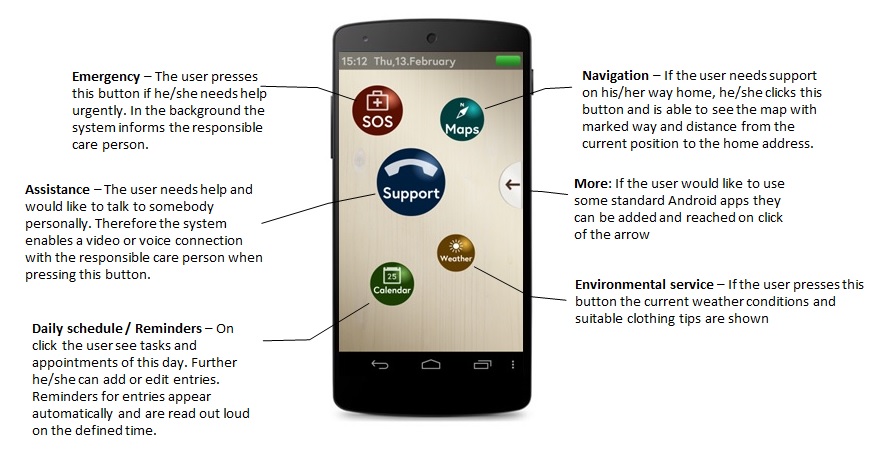
Confidence Helper
… is the counterpart for care givers
